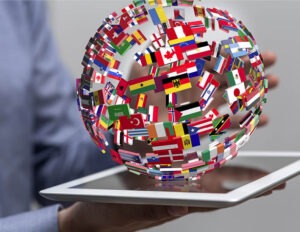Importance of Speaking Bilingually: Public Relations, Relaciones Públicas, Quan Hệ Công Chúng
Published on April 17, 2024, 5:10 p.m.
by Stephanie Smith.
Working for international public relations involves the practice of PR across international boundaries and cultures, while multiculturalism pertains to various cultural or ethnic groups within a society. Both are important and necessary in the PR world.
Ana Skelton, a Spanish for business senior instructor at The University of Alabama, said, “Knowing Spanish, or more than one language, helps professionals effectively work in multicultural environments by knowing cultural differences.”
As the number of Hispanics and Latinos continues to rise in the United States, the demand for Spanish-speaking PR professionals is increasing every day.

More than words
Understanding Spanish, as well as any language, entails more than just linguistic proficiency. Knowing a language demonstrates an understanding of not only the language but also its culture.
“In the corporate world, knowing a second language can help someone understand their target market. Furthermore, it has the potential to enhance their capacity to work with different cultures, inside and outside of one’s company, just by being aware of cultural differences,” Skelton explained.
Many companies have faced failure when expanding internationally because they didn’t take the time to understand the culture and demographics of the places they were expanding into. Different countries have their own customs and gestures that Americans might not be familiar with unless they do their homework.
For example, when engaging with a client from a Latin American country, often they anticipate getting to know you on a personal level. To them, building a personal connection is crucial for a successful partnership.
The need for bilingual PR professionals
You do not have to venture beyond the borders of the United States to connect with Spanish speakers. The Spanish-speaking population within the country has surged in recent years, totaling 50 million speakers, making it the second-largest Spanish-speaking population globally. Projections indicate that by 2060 more than one in four Americans in the U.S. will be Latino.

This trend underscores the importance of a multicultural foundation in the practice of public relations. For example, Laura Otero, an account coordinator at Medigistic, noted, “My first internship that I landed was at an agency called CCOM Group. Our clients were Neutrogena, Clean & Clear and Aveeno, but our agency focused on only reaching the Spanish-speaking audience in the United States.”
There are numerous internships and jobs similar to Otero’s available in the U.S. and abroad. “Knowing another language opens a lot of doors,” Otero said. “There are lots of different untapped markets and job opportunities in the U.S. right now that need Spanish speakers.”
Spanish has become essential for the success of businesses located in specific cities across the U.S. According to an Ocean Transitions article, “Spanish is not really a courtesy as much as it is a requirement, especially in cities such as Miami, where 90% of Latinos speak Spanish at home, or Los Angeles, where 79% of people speak this language.”
The benefits
Apart from the clear advantages of being able to communicate with clients, colleagues and suppliers who speak the language, there are numerous other benefits to learning another language, regardless of whether you have international clients or not.
Being bilingual helps PR practitioners reach diverse target markets. “Knowing Spanish helped me land some pretty cool internships, because I understand a whole new audience and I can relate to a whole new culture,” Otero said.
At Mediagistic, most of Otero’s clients are in the Caribbean, so she communicates with them in English. However, her understanding of the Spanish language and culture makes her a better fit for them rather than someone who lacks knowledge of Spanish or the culture of Latin American and Caribbean countries.
Learning a second language enhances the brain in many different functions. “Knowing a language helps with visibility, flexibility, adaptability, communication, creativity and creating new opportunities,” said Skelton.
In the PR world, working for clients demands thinking outside the box to craft new and innovative campaigns. According to an article from the University of Potomac, “The more you learn about new cultures, the more you’ll look at the world around you from different perspectives. The change of views will make you more original, elaborate, and flexible — all qualities of being a creative person.”

In addition, many PR agencies prioritize diversity, equity and inclusion initiatives. Learning another language is an excellent way to deepen understanding of DEI and broaden perspectives on the world. “Knowing another language promotes inclusion and accessibility,” said Skelton.
The bottom line
Being bilingual makes a person more hirable and creates a win-win situation with the employers hiring them. PR professionals who know multiple languages help agencies connect with both their clients and their clients’ target audiences, creating “a thriving, successful work environment and positive results.”
As Skelton noted, “One of my colleagues was hired as an instructional designer for a company in Mobile, [Alabama,] and she told me that they only hired her because she knew Spanish.”
Learning Spanish is invaluable across all industries, and it’s never too late to start learning.




